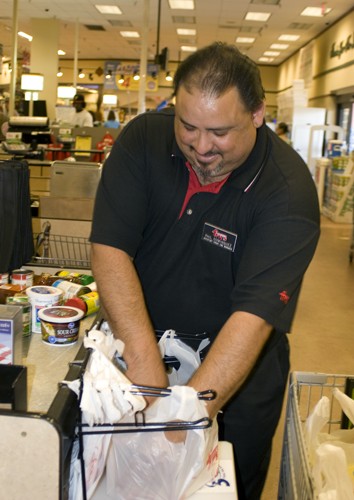While reusable grocery bags are great for the environment, the potential health risks of not washing them can be hazardous. A recent study done by the UA and Loma Linda University revealed that 97 percent of consumers do not wash their bags regularly.
Charles Gerba, a UA professor soil, water and environmental science and principal investigator for the project, said a good way to contaminate your food is by putting raw meat products and vegetables in a bag together. The germs might be destroyed when cooking the meat, but those vegetables still carry the bacteria.
“”Hardly anyone ever washes those bags. They are the least-washed item in the house,”” Gerba said.
Regional development junior Eric Mooney was surprised at this study’s results.
“”I think that’s pretty gross that people don’t think about that. I would think you would definitely want to wash it out,”” Mooney said.
Chemistry sophomore Jorge Cuellar attested to the lack of cleanliness. Cuellar, an Albertson’s employee, finds all sorts of things in customers’ bags.
“”It’s extremely horrid. I find leaves and random stuff,”” Cuellar said.
Cuellar said he is pretty meticulous when it comes to bagging and tries to separate items that may spread germs.
Interdisciplinary studies senior Heather Serrano is not concerned about bacteria risks.
“”I think antibodies are good. Americans are a little germophobic,”” Serrano said.
The best place for bacteria is a hot and humid environment, according to Gerba.
“”A car trunk in Arizona is like an incubator,”” he said.
The study involved climates other than Arizona, as Gerba and students researched San Francisco and Los Angeles, as well.
UA microbiology graduate student David Williams participated in the research and said the team found larger numbers of bacteria in Los Angeles and San Francisco compared to Tucson, probably a result of the drier climate here.
“”We had some lab members go to pick up the bags and the next day we processed as soon as possible, so that any bacteria in the bags wouldn’t die off. So we knew exactly what was in there,”” said Williams.
In order to obtain contaminated bags for research, students stood outside grocery stores offering new bags in exchange for customers’ old ones. After collecting the bag, they would ask a series of questions on how customers used and stored their bags.
“”The first part I think was the most interesting part, based on customers’ answers,”” said
Williams, referring to the high number of consumers who do not wash their bags after use.
According to Gerba, one of the main interests in doing this study arose from the potential California legislation to ban plastic bags. If the law is passed, Gerba feels that it would be best to have “”Please wash after using for groceries”” written on the bags.
Polypropylene reusable bags pose a challenge over their canvas counterparts, as their material may not be as washing machine friendly.
“”Handwashing is the downside,”” Gerba said of these types of bags.
He recommends purchasing canvas bags that are easy to throw in the wash after use but noted it’s impossible to completely avoid bacteria.
“”You’re always gambling with germs. You get the wrong situation with the wrong kind of E. coli, and you get pretty sick,”” Gerba said.









